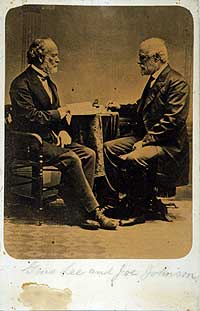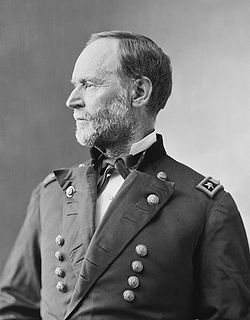OK, let’s discuss an opponent of the Fourteenth Amendment – or at least the version of the amendment as it existed in late February 1866. One of the principal opponents of that early version in the House was Robert Safford Hale (R. – NY). Hale hailed (sorry, I can’t help myself!) originally from Vermont (born 1822). He moved to Elizabethtown, New York (near Lake Champlain), opened a legal practice there in 1847 and later became a judge. The 39th Congress was his first term in Congress. He was one of the most conservative Republicans in the House.
Hale spoke against Bingham’s proposed amendment as it then stood on February 27, 1866. Rep. Hale’s remarks concerning the amendment as then proposed focused on the “equal protection” language, not on the “privileges and immunities” language, which I have bracketed for sake of clarity:
“The Congress shall have power to make all laws which shall be necessary and proper to secure [to the citizens of each State all privileges and immunities of citizens in the several States, and] to all persons in the several States equal protection in the rights of life, liberty and property.”
Rep. Hale construed this language as “a grant [to Congress] of the right to legislate for the protection of life, liberty, and property, simply qualified with the condition that it shall be equal legislation.” Granting Congress such power, he argued, would turn the Constitution on its head. Rather than being limited to specific, enumerated powers, Congress would be granted sweeping powers to legislate on almost every subject.
In the course of his speech, Rep. Hale turned to the Bill of Rights. His explanation of his understanding of the Bill demonstrates that
Rep. Hale believed that the Bill of Rights was already binding on and enforceable against the States in court. He had no problem with that idea. He objected only to granting Congress the power to enforce the Bill of Rights through general legislation.
Rep. Hale began by setting forth his understanding of the Bill of Rights. It protected citizens by limiting Federal
and State powers. What the Bill did not do was grant Congress power to enact legislation to enforce its provisions:
“Now, what are these amendments to the Constitution, numbered one to ten . . .. What is the nature and object of these articles? They do not contain, from beginning to end, a grant of power anywhere. On the contrary, they are all restrictions of power. They constitute the bill of rights, a bill of rights for the protection of the citizen, and defining and limiting the power of Federal
and State legislation. They are not matters upon which legislation can be based.”
That did not mean, however, that the Bill of Rights conveyed rights without remedy. “Throughout they provide safeguards to be enforced by the courts, and not to be exercised by the Legislature.”
Rep. Hale obviously was unaware of
Barron v. Baltimore. Rep. Bingham, who was aware of that case, jumped up and rudely challenged this assertion:
“I ask him [Mr. Hale] now if he knows of a single decision in which the sufficiency of the Constitution to secure to a party aggrieved in his person within a State the right to protection by the prosecution of a suit, which by the organic law of the State was denied to him, has ever been affirmed, either by Federal statute or Federal decision, or whether the nation has not been dumb in the presence of the organic act of a State which declares that eight hundred thousand natural-born citizens of the United States shall be denied the right to prosecute a suit in their courts, either for the vindication of a right or the redress of a wrong? I want an answer.”
In response, Rep. Hale admitted that he did not know of such a case. He simply assumed that the Constitution somehow protected the liberties of citizens. I quote the response in full because it is so striking:
“The gentleman will always get an answer when he asks me a question. It is never necessary for him to accompany his questions with a warning.
“I have not been able to prepare a brief for this argument, and therefore I cannot refer the gentleman to any case. As I never claim to be a very learned constitutional lawyer I have no hesitation in making the admission that I do not know of a case where it has ever been decided that the United States Constitution is sufficient for the protection of liberties of the citizen.
But still I have, somehow or other, gone along with the impression that there is that sort of protection thrown over us in some way, whether with or without the sanction of a judicial decision that we are so protected. Of course, I may be entirely mistaken in all this, but I have certainly somehow had that impression.”
After another Representative joined in to ask Rep. Bingham whether he was aware of such a case, Bingham said that was “ready to answer the gentleman now, and to produce such a decision” – almost certainly
Barron and
Livingston v. Moore, the cases that he cited and quoted from the next day (see my post immediately below). Hale, however, objected that this was a “side issue” and stated that he preferred to continue with his speech.
Shortly thereafter, Hale nonetheless returned to the issue of court enforcement of the Bill of Rights. Yet again, he made clear that he understood that the Bill applied to the States and was enforceable against the States in court:
“If he [Rep. Bingham] claims that those provisions of the constitution or the laws of Oregon [to which Bingham had referred] are inconsistent with the bill of rights contained in the Constitution of the United States, then I answer that
his remedy is perfect and ample, and the courts may be appealed to vindicate the rights of the citizens, both under civil and criminal procedure. Their powers are ample; it never was questioned,
it never could be questioned, that the decrees of the courts, in all the States at least where slavery did not exist, have been thoroughly and sufficiently enforced.”
In short, even the most conservative Republican, one who clearly believed in a federal government of limited powers, believed that the Bill of Rights was binding on the States and thought that it was perfectly natural to assume that citizens could vindicate those rights in court.
No wonder, then, that the speeches of Rep. Bingham and Senator Howard explaining the Privileges or Immunities Clause elicited few if any objections. So far as I'm aware, no Republican – including Rep. Hale -- stated during the debates that he believed that the Bill of Rights did not and should not apply to and restrict the States. (As I’ve noted before, Radicals complained that the amendment did not go even further and grant political rights, particularly the right to vote, as well as civil rights.) Rep. Hale and a handful of other Republican legislators objected only to granting Congress sweeping enforcement powers.
The final version of the amendment passed by the House (and Senate) in June 1866 may have alleviated some or all of Rep. Hale’s concerns. The enforcement provision of the final version was placed in a separate Section 5. Although it affirmed the enforcement power of Congress, it did not contain the language that Rep. Hale found most offensive. It stated simply: “The Congress shall have the power to enforce, by appropriate legislation, the provisions of this article.” Perhaps also, Rep. Bingham’s quotations from
Barron and
Livingston v. Moore and the need to overrule
Dred Scott ultimately convinced Rep. Hale that the amendment was essential to "vindicate the rights of the citizens." For whatever reason, Hale voted for the final version of the amendment.
All quotes are from The Congressional Globe, 39th Congress, First Session, pp. 1063-65 (Feb. 27, 1866). All emphasis within the quotes is mine. Easy access to the Globe for the 39th Congress may be found
here.
 Justice Nisbet explained that, although the common law did not protect slaves, the lot of slaves was far better in Georgia than it had been in Africa. In “that dark land” there was “pure, unmitigated slavery.” So too was slavery at first unmitigated in Georgia “until legislation, prompted by christianity, softened its severities.” Justice Nisbet then sketched out his vision of slavery leavened with Christian charity:
Justice Nisbet explained that, although the common law did not protect slaves, the lot of slaves was far better in Georgia than it had been in Africa. In “that dark land” there was “pure, unmitigated slavery.” So too was slavery at first unmitigated in Georgia “until legislation, prompted by christianity, softened its severities.” Justice Nisbet then sketched out his vision of slavery leavened with Christian charity:





















